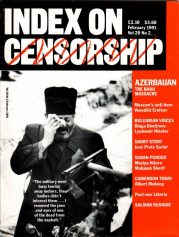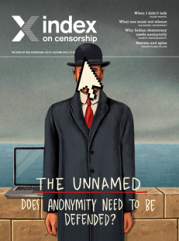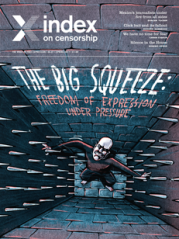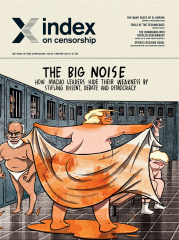12 Mar 2020 | News and features, Student Reading Lists
[vc_row][vc_column][vc_column_text]In August 2019 the Indian government under Narendra Modi, leader of the the Hindu nationalist Bharatiya Janata Party, revoked Article 370 of the Indian constitution. The article had granted the state of Jammu and Kashmir the autonomy to write their own constitution and make their own laws. Since the article was revoked, residents of Jammu and Kashmir have been subjected to the world’s longest internet shutdown, a serious breach of their right to free expression and to access information. As the ban on high-speed internet continues, Index looks back on the history of freedom of expression in India, from the years following The Emergency, to the present.

Libya: Criticise & be killed, the December 1980 issue of Index on Censorship magazine
In 1975 Prime Minister Indira Gandhi was convicted of election malpractice conducted during her 1971 campaign. Despite this, she clung onto power and declared a state of emergency which lasted for 19 months, known as The Emergency. During this time, members of the political opposition were imprisoned and the press heavily censored. In this article written in 1980, the year Gandhi was re-elected, Michael Henderson questions if Indian journalists have a long enough memory and a robust enough spirit to stand up to a prime minister with a clear and recent track record of control of the press.
Read the full article[/vc_column_text][/vc_column][/vc_row][vc_row][vc_column][vc_column_text]

Black voices in South Africa, the December 1984 issue of Index on Censorship magazine
In 1984, George Theiner writes of an India still scarred by The Emergency and a visit to Index on Censorship by Mr Justice A N Grover, chairman of the Press Council of India, who took issue with the magazine’s continuing criticism of the Indian press. Theiner interviewed journalists about the future of democracy and a free press under Indira Gandhi. He found a mixture of those who were still in shock about the censorship during The Emergency, and those who were complacent in a belief that it couldn’t happen again. (The future of India under Gandhi came to be something of a moot point as, in October 1984, a few months after this article was published, she was assassinated by her own bodyguards.)
[/vc_column_text][vc_column_text][/vc_column_text][/vc_column][/vc_row][vc_row][vc_column][vc_column_text]

Azerbaijan: the Baku Massacre, the February 1991 issue of Index on Censorship magazine
In 1991 India had a free press… in newspapers. Television and radio were state-owned and state-exploited. Other innovative types of media became a political battleground, with opposition parties promising to release the government’s grip on a news outlet that was fast evolving. Sidharth Bhatia’s piece details the independent video magazines set up by journalists which had to be rented from a video shop. When these magazines became successful, reaching a wide audience and providing information not stifled by a state agenda, government censorship began to encroach upon them.
Read the full article [/vc_column_text][/vc_column][/vc_row][vc_row][vc_column][vc_column_text]

The war of the words, the March 2014 issue of Index on Censorship magazine
Prayaag Akbar examines the role the rich and powerful have in press censorship in India, but in this case it is wealthy business owners, rather than the government, who come under scrutiny. Media outlets who find themselves owned by a large business conglomerate, may then be under pressure to self-censor in order to avoid reporting negatively on the hand that feeds them. Akbar cites examples of the collision of business interests with journalistic integrity as the richest men in India buy up large portions of the national media groups.
Read the full article
[/vc_column_text][/vc_column][/vc_row][vc_row][vc_column][vc_column_text]

The unnamed, the September 2016 issue of Index on Censorship magazine
Is online anonymity allowing trolls to abuse women without consequences, or it is vital for the safety of those whose expression does not follow the party line? In 2016, as Twitter became more widely used in India, and issues of trolling became apparent, government ministers suggested removing the anonymity of trolls in a bid to increase accountability. Suhrith Parthasarathy reports on how state involvement with online expression could lead to the anonymity of activists being revoked to protect state interests.
Read the full article[/vc_column_text][/vc_column][/vc_row][vc_row][vc_column][vc_column_text]

The Big Squeeze, the April 2017 issue of Index on Censorship magazine
In November 2016, a Supreme Court order made it obligatory to stand during the national anthem, which is played in Indian cinemas before the film begins, equating being patriotic with being a law-abiding citizen. Lawyer and writer Suhrith Parthasarathy examines the legal complexities of enforcing shows of patriotism in a country whose constitution guarantees freedom of expression, and speaks to people who have been subject to police interviews for choosing to stay seated.
Read the full article[/vc_column_text][/vc_column][/vc_row][vc_row][vc_column][vc_column_text]

Is This All the Local News?, the April 2019 issue of Index on Censorship magazine
Rituparna Chatterjee reports on the importance of local news, and threats faced by local news journalists in India. Journalists working in rural parts of India can face pay too low to survive on, and can be susceptible to bribes from local police officers and politicians, keen to censor scandals. Chatterjee also highlights how tribal and indigenous communities can end up excluded from the national narrative of India when large media conglomerates do not report on issues in the areas they live in.
Read the full article[/vc_column_text][/vc_column][/vc_row][vc_row][vc_column][vc_column_text]

The Big Noise, the December 2019 issue of Index on Censorship magazine
The Emergency of 1975-1977 has been seen in later years as a blip in freedom of expression in India. However, since the election of Modi to prime minister in 2014, freedom of expression in India is taking a hit. Modi’s supporters are instilling fear and committing violence against those considered outsiders, often Muslims. Such violence is not being roundly condemned by their leader; his silence is taken as tacit approval. Meanwhile the internet shutdown imposed on Kashmir has not been fully lifted, an attack on access to information.
Read the full article[/vc_column_text][/vc_column][/vc_row]
21 Mar 2019 | Asia and Pacific, India, News and features
[vc_row][vc_column][vc_column_text]

Mahatma Gandhi during his trial for sedition in Match 1922.
It’s been 72 years since India gained independence from Britain, but sedition remains entrenched not only in law (Section 124-A of the Indian Penal Code), but also in the mindset of successive governments.
In 1922, Mahatma Gandhi, leader of the Indian independence movement, was tried and prosecuted for “bringing or attempting to excite disaffection towards the British Government established by law in British India”, under Section 124-A.
“Affection cannot be manufactured or regulated by law,” Gandhi said while on trial. “If one has no affection for a person or system, one should be free to give the fullest expression to his disaffection, so long as he does not contemplate, promote, or incite to violence.”
“Sedition was made an offence under the Indian Penal Code of 1860 which was drafted by [British Whig politician] Thomas Macaulay,” Suhrith Parthasarathy, a lawyer and writer based in Chennai, India, tells Index on Censorship. “It was unquestionably a weapon at the hands of the colonial government.”
Jawaharlal Nehru, India’s first prime minister, and other prominent figures believed sedition should have no place in the newly independent India’s law books, Parthasarathy adds, “but unfortunately no elected government has thought it necessary to amend the IPC and delete Section 124-A”.
The authorities in India today are using Section 124-A to stifle dissent. A Manipur student activist was arrested over a social media post on the contentious Citizenship Bill, 14 students of Aligarh Muslim University were arrested for raising anti-national slogans on campus, and four students of Kashmiri origin in Rajasthan were charged with sedition over social media posts about last month’s terror attack in Jammu and Kashmir.
Parthasarathy says it is difficult to predict the outcome of these ongoing cases. “Instances of conviction where people have had to face imprisonment for sedition are rare,” he adds. “But the process is often a greater punishment — people accused of the offence face imprisonment and a trial, which can be long, arduous and hugely chilling.”
Section 124-A criminalises anyone who “through words, either written or spoken, or by signs, or by visual representation, or otherwise, brings or attempts to bring into hatred or contempt, or excites or attempts to excite disaffection towards the government”, with the term disaffection meaning “disloyalty and all feelings of enmity”.
The misuse of sedition law is not specific to any one political party in India. Since independence, many writers, activists and cartoonists have been accused of sedition by governments across the country as a response to legitimate criticism.
In the 1962 case of Kedar Nath Singh v State of Bihar, the Supreme Court of India, upholding the constitutional validity of 124-A, ruled that a person could be prosecuted if they “incitement to violence or intention or tendency to create public disorder or cause disturbance of public peace”.
In its third attempt to determine the validity of sedition, earlier last year, the Law Commission of India observed that while dissent is essential to any democracy, law enforcement agencies must use sedition law judiciously. Additionally, it also held that it is necessary for the Supreme Court to interpret the provisions of sedition law. The report also notes that the United Kingdom has itself abolished its own law on sedition almost a decade ago. While the powers of the Law Commission of India are limited to providing suggestions and recommendations only, the Parliament of India, the lawmaking body of the government, and the judiciary, the custodian of human rights, ought to revisit the justification of this provision.
With the indiscriminate use of archaic laws for dissenting against the government, many have raised their voices against such arbitrary restrictions on the fundamental right to free speech and expression, which is granted under the Constitution of India. Given the record of the ruling party in the last four years, intolerance of criticism is only seeing a rise in the country with authorities clamping down on free speech behind the garb of disloyalty and anti-national sentiments.
In 2015, Section 66A of the Information Technology Act 2000, which criminalised online speech considered “grossly offensive”, “menacing”, and caused “annoyance”, was struck down as unconstitutional due to the ambiguity of such terms. The Supreme Court of India held that any restrictions on speech could only be deemed reasonable under Section 19(2) of the Constitution of India. While the sedition law suffers a similar problem with definition, along with a lack of procedural safeguards, the Supreme Court has argued time and again that seditious words or actions are likely to threaten public order or incite violence, which is a reasonable restriction on free speech.
In data submitted to the Parliament of India by the Ministry of Home Affairs, which is in charge of law and order in the country, between 2014 and 2016, the first three years of the current government’s time in power, 179 people were arrested on the charge of sedition with only two convictions. This leads many to believe that authorities are abusing the law to stifle dissent and harass those who speak out.
There is a growing demand for amending the sedition law or repealing this relic of the past. However, there is an urgent necessity to first address the systemic flaws to ensure that these laws are not misused so as to mock free speech in India.
“The only amendment that we need on sedition is to remove Section 124-A, which parliament, if it has the will, can easily do,” Parthasarathy says. “P Chidambaram of the Indian National Congress has said recently that if the congress comes to power they’ll remove section 124-A from the IPC. But we have to ask the congress why they hadn’t thought of removing it earlier.” With a general election due to take place on 11 April, congress’s manifesto committee has promised to repeal sedition law.
“I would be very pessimistic of change coming from parliament,” Parthasarathy concludes. “Perhaps one day the Supreme Court will reconsider its 1962 verdict and strike Section 124-A down, for it unquestionably violates the right to freedom of speech and expression.”[/vc_column_text][/vc_column][/vc_row][vc_row][vc_column][vc_basic_grid post_type=”post” max_items=”4″ element_width=”6″ grid_id=”vc_gid:1553177738983-78591bd7-912e-5″ taxonomies=”6514″][/vc_column][/vc_row]
20 Mar 2019 | Awards, News and features
[vc_row][vc_column][vc_video link=”https://youtu.be/Ux4icHaQpoQ”][vc_column_text] SFLC.in (Software Freedom Law Centre) tracks internet shutdowns in India, a crucial service in a country with the most online blackouts of any country in the world. The tracker was the first initiative of its kind in India, and has quickly become the top source for journalists reporting on the issue.
SFLC.in (Software Freedom Law Centre) tracks internet shutdowns in India, a crucial service in a country with the most online blackouts of any country in the world. The tracker was the first initiative of its kind in India, and has quickly become the top source for journalists reporting on the issue.
More Indians are gaining access to the internet and the government even rolled out a Digital India project to make government services available to its citizens online. But while this move online has been beneficial for many, internet connections have also become less reliable.
SFLC.in has noticed a staggering increase in the number and frequency of shutdowns in the country, often to subdue unrest or prevent cheating during examinations. The organisation has recorded at least 251 shutdowns since 2012, 113 of which took place in 2018 alone, the most in any country in the world – and by a wide margin.
Since service providers don’t notify the public of a shutdown, SFLC.in monitors the national and local press, and then updates its Internet Shutdown Tracker with any reports. The tracker takes the form of a real-time map of ongoing shutdowns by state and district, so that the information can be used to hold local institutions accountable.
The website also provides reports and analysis based on the project’s database, and keeps a record of blocked URLs and take-down notices received by websites. SFLC.in has since made the source code available for activists for free.
The tracker has become a go-to resource for politicians and MPs as well as reporters: it was cited in discussions in the Indian parliament, and its data convinced the government to amend existing legislation.
The organisation, which brings together lawyers, policy analysts and technologists to fight for digital rights, produces reports and studies on the state of the Indian internet, also has a productive legal arm. SFLC.in has conducted landmark litigation cases, petitioned the government on freedom of expression and internet issues, and campaigned for WhatsApp and Facebook to fix a feature of their platform that has been used to harass women in India.
It also provides training and pro-bono services to journalists, activists and comedians whose rights have been curtailed.
SFLC.in recently expanded the project to include a mechanism for citizens to report shutdowns in their area and provide information on how it affected them and their communities. In parallel, SFLC.in is seeking to deepen the understanding of economic losses caused by internet shutdowns, and to step up its advocacy and strategic litigation work to prevent authorities from shutting down the internet illegally or beyond situations of public emergency and public safety.[/vc_column_text][vc_separator][vc_row_inner][vc_column_inner width=”1/2″][vc_single_image image=”104691″ img_size=”full” onclick=”custom_link” link=”https://www.indexoncensorship.org/2019/01/awards-2019/”][/vc_column_inner][vc_column_inner width=”1/2″][vc_column_text]
Index on Censorship’s Freedom of Expression Awards exist to celebrate individuals or groups who have had a significant impact fighting censorship anywhere in the world.[/vc_column_text][/vc_column_inner][/vc_row_inner][vc_separator][/vc_column][/vc_row][vc_row][vc_column][vc_basic_grid post_type=”post” max_items=”4″ element_width=”6″ grid_id=”vc_gid:1552650168972-e2837402-6210-3″ taxonomies=”26925″][/vc_column][/vc_row]
18 Sep 2018 | Asia and Pacific, India, Magazine, News and features, Volume 47.03 Autumn 2018
[vc_row][vc_column][vc_single_image image=”102733″ img_size=”full” add_caption=”yes”][vc_custom_heading text=”India’s prime minister seeks to create an unquestioning press, writes John Lloyd in the autumn 2018 Index on Censorship magazine” google_fonts=”font_family:Libre%20Baskerville%3Aregular%2Citalic%2C700|font_style:400%20italic%3A400%3Aitalic”][/vc_column][/vc_row][vc_row][vc_column][vc_column_text]
Indian journalism has a strong claim to be the most important journalism in the world. It is still partly free, but increasingly fragile.
US papers and TV channels are routinely vilified by President Donald Trump, and this is both an astounding and a serious matter. So why is India more concerning?
Because the US news media can take care of themselves. And in doing so, take care of the business of truth seeking and telling.
India’s news media, with brave exceptions, are not in that position. The formidably disciplined Prime Minister, Narendra Modi, came to power in 2014, a deserved victory. But in power, Modi made clear that he believes the media need calling to heel.
Hence the litany of proprietors suppressing what might annoy him and the harassment of those who still seek to get out some version of the truth. The phenomenon is familiar: I saw it in Russia, as Vladimir Putin closed in on a chaotic but relatively free journalism.
Modi cannot shoulder all the blame. Corruption – coverage bought by politicians and corporate leaders – long predates him, but has not diminished. The hundreds of news channels, which claim to hold power to account, more often provide space for shouting bouts.
Poverty, violence against women and discrimination against the Muslim minority are often unreported because they are not part of the dominant narrative. The desire of owners, at every level, to pander to the powers that be, seeking to profit by doing so, is too strong.
India claims to be the world’s largest democracy. It is one still: governments change in broadly free elections; opposition can be fierce; the media are curbed but not silenced. The trend, however, is negative. And for what will be soon the world’s largest state, with a prime minister tending to the authoritarian, that matters greatly.
[/vc_column_text][/vc_column][/vc_row][vc_row][vc_column][vc_column_text]
John Lloyd is a contributing editor to the Financial Times and an author
Index on Censorship’s autumn 2018 issue, The Age of Unreason, asks are facts under attack? Can you still have a debate? We explore these questions in the issue, with science to back it up.
Look out for the new edition in bookshops, and don’t miss our Index on Censorship podcast, with special guests, on Soundcloud.
[/vc_column_text][/vc_column][/vc_row][vc_row content_placement=”top”][vc_column width=”1/3″][vc_custom_heading text=”The Age Of Unreason” font_container=”tag:p|font_size:24|text_align:left” link=”url:https%3A%2F%2Fwww.indexoncensorship.org%2F2018%2F09%2Fage-of-unreason%2F|||”][vc_column_text]The autumn 2018 issue of Index on Censorship magazine explores the age of unreason. Are facts under attack? Can you still have a debate? We explore these questions in the issue, with science to back it up.
With: Timandra Harkness, Ian Rankin, Sheng Keyi[/vc_column_text][/vc_column][vc_column width=”1/3″][vc_single_image image=”102479″ img_size=”medium” alignment=”center” onclick=”custom_link” link=”https://www.indexoncensorship.org/2018/09/age-of-unreason/”][/vc_column][vc_column width=”1/3″ css=”.vc_custom_1481888488328{padding-bottom: 50px !important;}”][vc_custom_heading text=”Subscribe” font_container=”tag:p|font_size:24|text_align:left” link=”url:https%3A%2F%2Fwww.indexoncensorship.org%2Fsubscribe%2F|||”][vc_column_text]In print, online. In your mailbox, on your iPad.
Subscription options from £18 or just £1.49 in the App Store for a digital issue.
Every subscriber helps support Index on Censorship’s projects around the world.
 SUBSCRIBE NOW[/vc_column_text][/vc_column][/vc_row]
SUBSCRIBE NOW[/vc_column_text][/vc_column][/vc_row]










 SFLC.in (Software Freedom Law Centre) tracks internet shutdowns in India, a crucial service in a country with the most online blackouts of any country in the world. The tracker was the first initiative of its kind in India, and has quickly become the top source for journalists reporting on the issue.
SFLC.in (Software Freedom Law Centre) tracks internet shutdowns in India, a crucial service in a country with the most online blackouts of any country in the world. The tracker was the first initiative of its kind in India, and has quickly become the top source for journalists reporting on the issue.